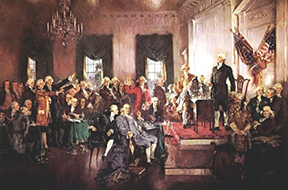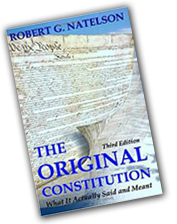 The Constitutional Studies Center combines careful, objective scholarship into the original understanding of the Constitution with advocacy for human freedom under law. It produces books, issue papers, articles, and legal briefs reporting the results of its research. Since 2010, the Center has had enormous influence on constitutional law cases and commentary, but also on policy makers and grass roots activists. For example, the Center’s research findings galvanized the massive and growing “Article V” movement to restore constitutional limits on the federal government.
The Constitutional Studies Center combines careful, objective scholarship into the original understanding of the Constitution with advocacy for human freedom under law. It produces books, issue papers, articles, and legal briefs reporting the results of its research. Since 2010, the Center has had enormous influence on constitutional law cases and commentary, but also on policy makers and grass roots activists. For example, the Center’s research findings galvanized the massive and growing “Article V” movement to restore constitutional limits on the federal government.
Constitutional Studies
- Home
- Constitutional Studies
Latest Posts
The greatly misunderstood Chief Justice John Marshall0
- July 16, 2011
One of the most enduring myths in American constitutional history is that Chief Justice John Marshall was a judicial activist whose decisions are good precedent for the modern federal monster state. Marshall was the fourth chief justice of the U.S. Supreme Court (third, if you don’t count John Rutledge, a recess appointment who was never
READ MOREReining in Congress: An Enforceable Balanced Budget Amendment0
- July 10, 2011
There is growing sentiment that one or more constitutional amendments may be necessary to rein in the runaway Congress. The principal mechanism the Founders built into the Constitution for such contingencies is the procedure in Article V by which two thirds of the state legislatures force what the Constitution calls a “Convention for proposing Amendments.”
READ MOREThe 1798 “Act for the Relief of Sick and Disabled Seamen:” Yet another “progessive” irrelevancy0
- July 3, 2011
As Tom Woods points out on his blog, advocates of Obamacare have dug up a 1798 federal statute that, they say, shows that the original understanding of the Constitution is broad enough to authorize federal health care programs. The statute authorized creation of federal hospitals for sailors. After I entered a brief response to his
READ MORE
Time Mag’s Constitutional Baby Babble0
- June 26, 2011
Several readers sent me for comment a lengthy cover article in Time Magazine by managing editor Richard Stengel. Stengel’s piece is one result of new public interest in our Constitution and in “first principles”—interest that has forced political liberals (Stengel has been a paid Democratic activist) to think about the document’s real meaning. Previously, of
READ MOREA Victory for the Tenth Amendment in the Supreme Court0
- June 20, 2011
Two years ago, I posted an item on the Tenth Amendment Center website entitled, “It’s the People’s Right.” My point was that federalism was not created primarily for the benefit of the states or state officials, but for the protection of individual liberty. I didn’t invent this argument—many others have recognized that it is the
READ MOREMore evidence the Constitution limited federal power0
- June 19, 2011
In my last post I showed how pre-Revolutionary colonial pamphlets espousing the American cause tend to rebut a favorite theory of some “progressive” writers—that the Constitution granted Congress almost complete power over all activities with interstate effects. Surprisingly, most delegates to the 1787 constitutional convention initially favored a central government nearly that powerful. They would
READ MORE

Get the latest edition of the popular work, The Original Constitution: What It Actually Said and Meant. You can buy it in either hard copy or Kindle form here.
Contact
 Rob Natelson, Senior Fellow, Constitutional Jurisprudence
Rob Natelson, Senior Fellow, Constitutional Jurisprudence
Email: rob.natelson1@gmail.com
Phone: 303-279-6536, ext 114
